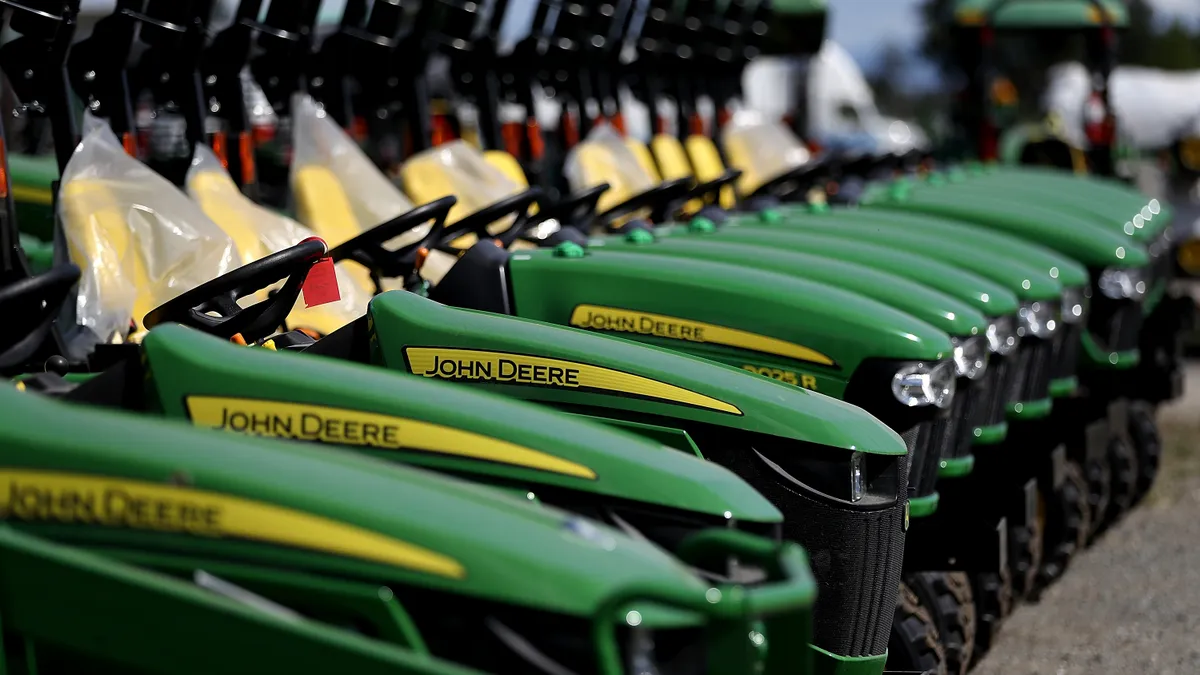Dive Brief:
- Joshua Jepsen, the current deputy financial officer for agricultural manufacturer Deere & Company, was elected as CFO for the company by its board of directors, a move to be effective Sept. 16, the company announced Thursday.
- Jepsen will replacing long-time Deere executive Rajesh Kalathur as CFO, who — having previously served as CFO for six years — stepped back into the position in May following a series of internal executive changes.
- Kalathur will continue as president for John Deere Financial and will resume his previous role as chief information officer, according to a Thursday filing with the Securities and Exchange Commission (SEC).
Dive Insight:
A 14-year veteran of the farm equipment company, Jepsen has acted as deputy financial officer since March per his LinkedIn profile. Prior to that role, he served as Deere’s director of investor relations for four years beginning January 2018, and has also held other key roles throughout his tenure at the agricultural manufacturer.
Jepsen will receive an annual base salary of $850,000 as CFO, per the Thursday filing, and continue to participate in both the company’s short-term and long-term incentive plans. The target award under the short-term incentive plan is increasing to 100% of his base salary while the target award under the long-term incentive plan will increase to 105% of his base for a total target of $892,500.
The CFO switch comes a few short months after the agricultural manufacturer shuffled several key executive positions this past May, announcing three high-level swaps among Deere insiders.
Kalathur, a 25-year alum of the firm, previously served as Deere’s CFO for six years between September 2012 and March 2019, per his LinkedIn profile, before reprising the position a few months ago when then-CFO Ryan Campbell became Deere’s President for Worldwide Construction & Forestry. He transitioned to the role of CIO in November 2018, and will cede back into the role following Jepsen’s move to CFO, per the company’s Thursday press release.
Meanwhile, fellow Deere insider Ganesh Jayaram took on the CIO role for Deere that same month following Kalathur’s move to the CFO position. He previously served as the manufacturer’s VP, information technology for six years. Jayaram, who remained at Deere for 15 years, is now serving as chief digital and information officer for American Airlines, a move announced by the airline Aug. 22 and effective as of Thursday, per the release.
Deere’s latest executive shuffle comes approximately three weeks after the company narrowed its outlook for the remainder of the year during its third quarter earnings report on Aug. 19. The company revised its full year outlook to a range of $7 billion to $7.2 billion, according to its most recent earnings release, compared to its prior forecast of between $7 billion to $7.4 billion. Deere reported net sales and revenues of $14.1 billion for the third quarter, a 22% increase.
Deere CEO and Chairman John May pointed to supply chain struggles and material shortages as key factors impacting the company’s third quarter earnings, with results reflecting “higher costs and production inefficiencies driven by the difficult supply-chain situation,” he said in a statement.
The company is also struggling with inventory shortages due to supply chain issues, with “effectively everything we are shipping from our factories…already retail sold,” according to Brent Norwood, director of investor relations during the firm’s Aug. 19 earnings call.
Jepsen, then serving as deputy financial officer, also spoke to the company’s focus on producing at higher levels during the third quarter earnings call, something that pushed up costs related to available supply, inflationary pressures and overhead inefficiencies, he said.
“So, maybe for example, we’ve incurred expedited freight and experienced production inefficiencies. Expedited freight comes at a premium,” Jepsen said during the earnings call. “And any time we have to touch machines or move them in our factories more than once, it comes at a cost. In that respect, 2022 has been a challenge, given the ramp in demand juxtaposed with the lost production in the first quarter and a challenging supply environment.”
Deere did not respond to requests for comment.












